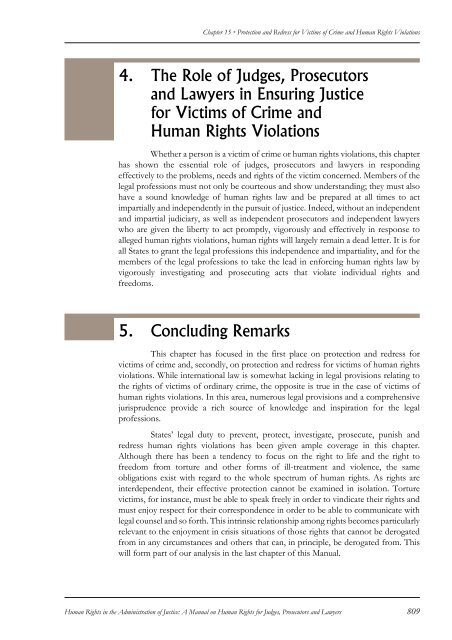protection and redress for victims of crime and human rights violations
protection and redress for victims of crime and human rights violations
protection and redress for victims of crime and human rights violations
You also want an ePaper? Increase the reach of your titles
YUMPU automatically turns print PDFs into web optimized ePapers that Google loves.
Chapter 15 • Protection <strong>and</strong> Redress <strong>for</strong> Victims <strong>of</strong> Crime <strong>and</strong> Human Rights Violations4. The Role <strong>of</strong> Judges, Prosecutors<strong>and</strong> Lawyers in Ensuring Justice<strong>for</strong> Victims <strong>of</strong> Crime <strong>and</strong>Human Rights ViolationsWhether a person is a victim <strong>of</strong> <strong>crime</strong> or <strong>human</strong> <strong>rights</strong> <strong>violations</strong>, this chapterhas shown the essential role <strong>of</strong> judges, prosecutors <strong>and</strong> lawyers in respondingeffectively to the problems, needs <strong>and</strong> <strong>rights</strong> <strong>of</strong> the victim concerned. Members <strong>of</strong> thelegal pr<strong>of</strong>essions must not only be courteous <strong>and</strong> show underst<strong>and</strong>ing; they must alsohave a sound knowledge <strong>of</strong> <strong>human</strong> <strong>rights</strong> law <strong>and</strong> be prepared at all times to actimpartially <strong>and</strong> independently in the pursuit <strong>of</strong> justice. Indeed, without an independent<strong>and</strong> impartial judiciary, as well as independent prosecutors <strong>and</strong> independent lawyerswho are given the liberty to act promptly, vigorously <strong>and</strong> effectively in response toalleged <strong>human</strong> <strong>rights</strong> <strong>violations</strong>, <strong>human</strong> <strong>rights</strong> will largely remain a dead letter. It is <strong>for</strong>all States to grant the legal pr<strong>of</strong>essions this independence <strong>and</strong> impartiality, <strong>and</strong> <strong>for</strong> themembers <strong>of</strong> the legal pr<strong>of</strong>essions to take the lead in en<strong>for</strong>cing <strong>human</strong> <strong>rights</strong> law byvigorously investigating <strong>and</strong> prosecuting acts that violate individual <strong>rights</strong> <strong>and</strong>freedoms.5. Concluding RemarksThis chapter has focused in the first place on <strong>protection</strong> <strong>and</strong> <strong>redress</strong> <strong>for</strong><strong>victims</strong> <strong>of</strong> <strong>crime</strong> <strong>and</strong>, secondly, on <strong>protection</strong> <strong>and</strong> <strong>redress</strong> <strong>for</strong> <strong>victims</strong> <strong>of</strong> <strong>human</strong> <strong>rights</strong><strong>violations</strong>. While international law is somewhat lacking in legal provisions relating tothe <strong>rights</strong> <strong>of</strong> <strong>victims</strong> <strong>of</strong> ordinary <strong>crime</strong>, the opposite is true in the case <strong>of</strong> <strong>victims</strong> <strong>of</strong><strong>human</strong> <strong>rights</strong> <strong>violations</strong>. In this area, numerous legal provisions <strong>and</strong> a comprehensivejurisprudence provide a rich source <strong>of</strong> knowledge <strong>and</strong> inspiration <strong>for</strong> the legalpr<strong>of</strong>essions.States’ legal duty to prevent, protect, investigate, prosecute, punish <strong>and</strong><strong>redress</strong> <strong>human</strong> <strong>rights</strong> <strong>violations</strong> has been given ample coverage in this chapter.Although there has been a tendency to focus on the right to life <strong>and</strong> the right t<strong>of</strong>reedom from torture <strong>and</strong> other <strong>for</strong>ms <strong>of</strong> ill-treatment <strong>and</strong> violence, the sameobligations exist with regard to the whole spectrum <strong>of</strong> <strong>human</strong> <strong>rights</strong>. As <strong>rights</strong> areinterdependent, their effective <strong>protection</strong> cannot be examined in isolation. Torture<strong>victims</strong>, <strong>for</strong> instance, must be able to speak freely in order to vindicate their <strong>rights</strong> <strong>and</strong>must enjoy respect <strong>for</strong> their correspondence in order to be able to communicate withlegal counsel <strong>and</strong> so <strong>for</strong>th. This intrinsic relationship among <strong>rights</strong> becomes particularlyrelevant to the enjoyment in crisis situations <strong>of</strong> those <strong>rights</strong> that cannot be derogatedfrom in any circumstances <strong>and</strong> others that can, in principle, be derogated from. Thiswill <strong>for</strong>m part <strong>of</strong> our analysis in the last chapter <strong>of</strong> this Manual.Human Rights in the Administration <strong>of</strong> Justice: A Manual on Human Rights <strong>for</strong> Judges, Prosecutors <strong>and</strong> Lawyers 809
















